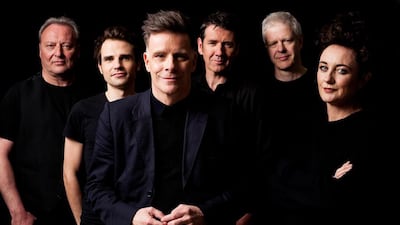This year marks 30 years since the Scottish pop band Deacon Blue were formed in rainy Glasgow. They are still going strong, but it’s been far from a bump-free ride.
After enjoying huge success with late-1980s hits including Dignity and Real Gone Kid, by 1994, after four successful albums, they had called it a day.
After reforming five years later, the guitarist Graeme Kelling died of pancreatic cancer in 2004.
They worked sporadically in the second half of the 2000s, but more than a decade passed between LPs, a barren spell that was broken with the late-career resurgence of 2012's The Hipsters.
But are things as calm as they seem these days in camp Deacon Blue? The frontman and songwriter Ricky Ross says last year's A New House could be the band's final album.
You’re talking to me from Glasgow, a city that heavily influenced your early work, especially debut LP Raintown. Does it still hold the same power over your songwriting today?
It’s a funny thing – I never really wanted to move away. I always feel that when it comes down to writing a record, somehow it’s written here. I’ve been in the same house for more than 20 years and I look at the same room where I write, so it tends to be in and around here that I function best.
So the same house for 20 years and now the same band for 30. Has it hit you?
It’s absolutely, almost unimportant. When you start a band you’re hoping that a year from now your life will have changed. And in one year, between 1986 and 1987, it certainly did, in terms of being recognised and people having heard of us. So a year can be an enormous change in your life. And then when you’re this age, 10 years go past and it feels like the other week.
You’ve also managed to maintain a marriage for 25 years – to bandmate and vocalist Lorraine McIntosh. Would she tell you if she didn’t like a song you had written?
She probably would. That’s one of the hardest things to learn as a songwriter. First, you’ve got to like it yourself and then you play it to the next person. And for me, it’s normally Lorraine because she’s the one in the house. I get a very quick reaction – and sometimes that’s pretty honest and you never get beyond that. That’s one of the sad things – songs are like children and the ones that are less pretty, less popular, less outgoing than other ones, you get attached to the songs no one else wants.
As a songwriter you’ve collaborated with some big names, including James Blunt, Ronan Keating and K T Tunstall. Who left the greatest impression?
Working with Jamie Cullum was great. It was really lovely because I'm a piano player by desire – I enjoy playing and I write on piano but I'm not really a piano player – so to spend a couple of days just listening to him play, that was great. We wrote a couple of songs together and he had a hit with one of them [I'm All Over It].
There were five years where you didn’t write a song for Deacon Blue – during the big split of 1994-99 – was that a necessary experience? Any regrets?
I think that was really necessary. I think if we’d carried on and tried to make another record it would have been a very difficult record to make. None of us really wanted to make the same record, it was getting harder for me to imagine what a Deacon Blue record could be and we all just needed some time to do other things. And I think we genuinely thought that was it.
When you got back together, why was there such a big gap between 2001's Homesick and 2012's The Hipsters?
There was nothing really sinister about that. I think we just discovered we were playing together, we were doing tours and we didn’t really ever have an album – we had no aim. It just came out of that – “either we make a record or we stop, because we can’t keep going out and doing the same thing”. And I think the audience realised: “Oh gosh, they do actually have something new to sing about.”
So is there another album on the horizon?
I don’t have any plans. An album is one of those things – if it’s there, it presents itself. A record doesn’t just walk out at you. You’ve got to feel you can’t avoid it, feel it pushing you – if that happens there will be one. If not, there won’t – it’s as simple as that.
You played the same venue, The Irish Village in 2002 and tickets were Dh95. Thursday’s show is Dh185. That’s nearly twice as much money ...
So will we be twice as good? Well, we’ll attempt to be. It will be a fun gig. Hopefully we’ll be good value for money. I don’t remember much of the last time – one gig tends to be much like another – except that it was very hot.
Deacon Blue perform at The Irish Village, Garhoud, Dubai, Thursday, April 16 from 9pm. Tickets are Dh185
Other gigs
Red House Sessions
A new concert series celebrating the UAE’s unsigned, underground rock scene, this debut gig will feature performances by retro rockers Riff Raff and upbeat punks Dead Shakes, plus DJ sets from the folks at indie/punk club night Bad House Party.
Friday, April 17 from 9pm at Legends Sports Bar, Chelsea Plaza Hotel, Satwa, Dubai. Dh60
Think Floyd
This UK Pink Floyd tribute will perform the whole of 1975's classic Wish You Were Here LP, plus more prog-pop classics.
Thursday, April 16 from 7.30pm at the Abu Dhabi City Golf Club. Friday, April 17 from 9pm at The Music Room, Dubai. Tickets are Dh100 from
rgarratt@thenational.ae

